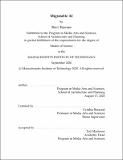| dc.contributor.advisor | Cynthia Breazeal. | en_US |
| dc.contributor.author | Tejwani, Ravi. | en_US |
| dc.contributor.other | Program in Media Arts and Sciences (Massachusetts Institute of Technology) | en_US |
| dc.date.accessioned | 2021-01-06T18:33:28Z | |
| dc.date.available | 2021-01-06T18:33:28Z | |
| dc.date.copyright | 2020 | en_US |
| dc.date.issued | 2020 | en_US |
| dc.identifier.uri | https://hdl.handle.net/1721.1/129187 | |
| dc.description | Thesis: S.M., Massachusetts Institute of Technology, School of Architecture and Planning, Program in Media Arts and Sciences, September, 2020 | en_US |
| dc.description | Cataloged from student-submitted PDF version of thesis. | en_US |
| dc.description | Includes bibliographical references (pages 65-68). | en_US |
| dc.description.abstract | Conversational AI agents are proliferating, embodying a range of devices such as smart speakers, smart displays, robots, cars, and more. We can envision a future where a personal, conversational AI agent could migrate across different form factors and environments to always accompany and assist its user to support a far more continuous, personalized, and collaborative experience. This opens the question of what properties of a conversational AI agent should migrate across embodiments. How must the behavior of the migrated agent be when it communicates the user's personal and non-personal information in different spaces (public or private) and how does this impact the user perception. This thesis presents, Migratable AI, a system and method for migration of a conversational AI agent, capable of understanding users' intents across multiple embodiments while maintaining the relationship with the user. | en_US |
| dc.description.abstract | In the system, two key elements of migration - information migration and identity migration are explored and further validated on 2x2 between-subjects study on 72 participants to investigate the user perception through subjective, behavioral, and affective analysis. The results suggest that users show highest trust, competence, likeability, and social presence along with greatest joy and surprise towards the conversational AI agent when both identity and information are migrated across embodiments. In this thesis, I further introduce the migration dataset, which consists of the crowdsourced dialog conversations based on migration context - defined as the type of user information in the utterances (personal or non-personal) and the kind of embodiment to which the agent migrates into (public or private). | en_US |
| dc.description.abstract | The generative and information retrieval models are trained on the migration dataset using with and without migration context, and the results of both qualitative metrics and human evaluation are reported. The migration dataset from this thesis could be useful for training future migratable AI systems. | en_US |
| dc.description.statementofresponsibility | by Ravi Tejwani. | en_US |
| dc.format.extent | 68 pages | en_US |
| dc.language.iso | eng | en_US |
| dc.publisher | Massachusetts Institute of Technology | en_US |
| dc.rights | MIT theses may be protected by copyright. Please reuse MIT thesis content according to the MIT Libraries Permissions Policy, which is available through the URL provided. | en_US |
| dc.rights.uri | http://dspace.mit.edu/handle/1721.1/7582 | en_US |
| dc.subject | Program in Media Arts and Sciences | en_US |
| dc.title | Migratable AI | en_US |
| dc.type | Thesis | en_US |
| dc.description.degree | S.M. | en_US |
| dc.contributor.department | Program in Media Arts and Sciences (Massachusetts Institute of Technology) | en_US |
| dc.identifier.oclc | 1227278462 | en_US |
| dc.description.collection | S.M. Massachusetts Institute of Technology, School of Architecture and Planning, Program in Media Arts and Sciences | en_US |
| dspace.imported | 2021-01-06T18:33:27Z | en_US |
| mit.thesis.degree | Master | en_US |
| mit.thesis.department | Media | en_US |
